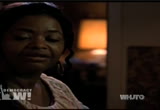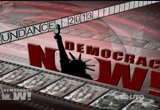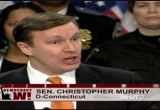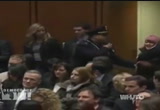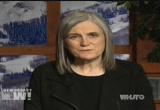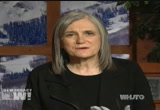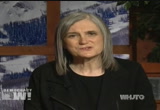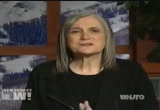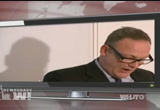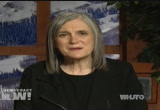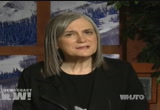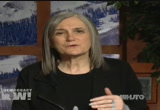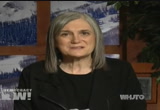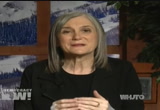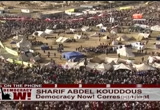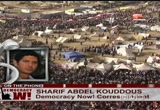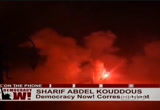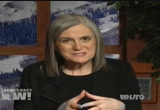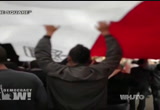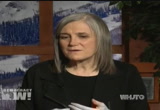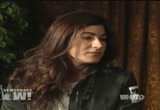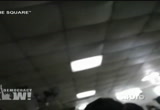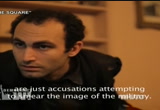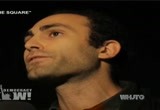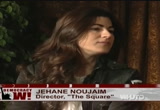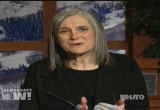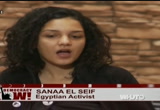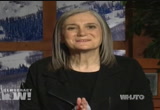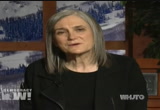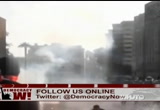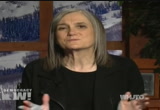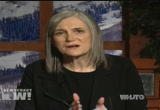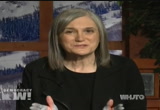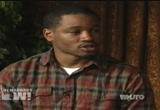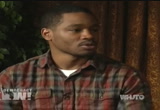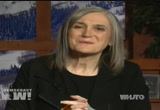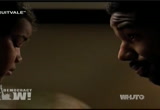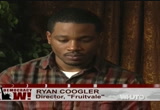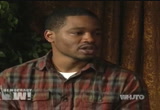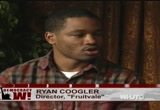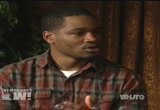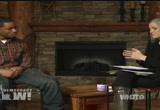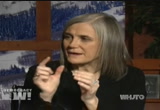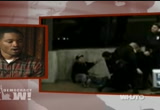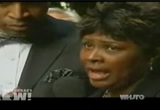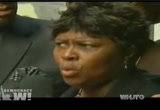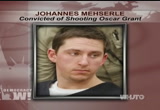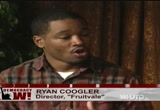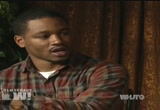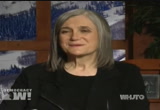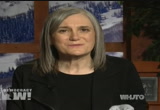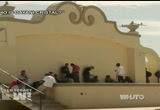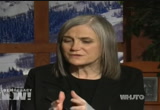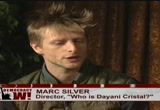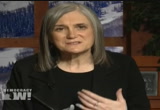tv Democracy Now WHUT January 25, 2013 6:00pm-7:00pm EST
6:00 pm
01/25/13 01/25/13 [captioning made possible by democracy now!] >> from park city, utah, this is "democracy now!" >> today a revolution is what we witnessed. >> you can see the protesters pushing them back critics saying hosni mubarak is stepping down. >> egypt will never be the same. >> two years ago today, thousands of egyptians fill tahrir square, sparking a
6:01 pm
revolution that brought down dictator hosni mubarak. we will speak with sharif abdel kouddous from cairo, a protest march interfere and speak with egyptian filmmaker jehane noujaim. it was four years ago this month when oscar grant, the 22-year old bay area resident, was shot to death by a bart police officer on new year's day in 2009. a new dramatic film portrays the last day of oscar's life. >> to you have plans for the night? >> nothing major. head out to the city. train don't you take the out there? that way you guys can drink and hang out and not have to worry about anything. >> getting over there and getting back? >> no traffic, either. you know it is going to be crazy going and coming back.
6:02 pm
>> we might take it. >> we will speak with first-time filmmaker, 26-year-old ryan coogler who worked as a social worker to juvenile detention center in san francisco. then, "who is dayani cristal?" >> a new film featuring the mexican actor gael garcia bernal examines the story of a migrant who died in the arizona desert in 2010. all of that and more coming up. this is "democracy now!," democracynow.org, the war and peace report. i'm amy goodman. democratic senators have
6:03 pm
unveiled their measure to reintroduce the assault weapons ban in the aftermath of the newtown massacre that killed 27 people, including 20 children, last month. senator dianne feinstein of california and connecticut senator chris murphy have announced the new legislation. >> weapons design originally for the military to kill large numbers of people in close combat are replicated for civilian use. they fall into the hands one way or another of grievance killers, gangs, of those who are mentally unstable or ill. >> kids would be alive today in newtown, connecticut if the law we are proposing today were in place on december 14 of last year. it is as simple as that. white we know that? the data tulsa's despite with the gun lobby will say, the first assault weapons ban even with its double- >> the measure would outlaw the
6:04 pm
manufacturing sale of 157 semiautomatic weapons and magazine clips holding more than 10 rounds. the previous assault weapons ban expired in 2004 after 10 years in affect. the new measure is expected to meet stiff resistance from house republicans and even some senate democrats in states with loose restrictions on firearms. democratic senator john kerry appeared before the senate foreign relations committee thursday for his confirmation hearing to become the next secretary of state. his -- he has been a member of it since 1985. during his introductory remarks, he was interrupted by a protester with the group codepink, the activist rushed out of the room as she called for a changed u.s. policy in the middle east including cutting aid to israel. john kerry responded by invoking his own days as an anti-war activist in the early 1970's upon returning from military service in vietnam. >> killing thousands of people.
6:05 pm
they are not a threat to us. when is it going to be enough? when are enough people going to be killed? [indiscernible] >> when i first came to washington to testify i was testifying as part of a group of people who came here to have their voices heard. and that is above all what this place is about, so i respect -- i think the woman who was voicing her concerns about that part of the world, and everyone of you have trouble there, some recently. senator mccain, you were there in a refugee camp and i know you heard this kind of thing. people measure what we do. >> the senate foreign relations committee is expected to a chance john kerry's nomination to a full senate vote early next week. president obama has appointed former new york prosecutor mary jo white to head the securities and exchange commission and a second term rid appearing on
6:06 pm
thursday, obama urged the senate to grant her a speedy confirmation. >> i am confident she has experience and resolve to tackle these complex issues and protect the american people in a way that a smart and in a way that is fair. i expect the senate to confirm mary jo as soon as possible so she can get to work. >> mary jo white would be the first former prosecutor to head the sec, a critical position for the oversight of wall street. while supporters of bills for her nomination as tougher and financial regulation in the second term, she also brings the job, a resume, of defending top financial institutions as a white-collar defense attorney. her client list includes former bank of america head ken lewis, the board of morgan stanley, and the firm jpmorgan chase. in a statement, the consumer advocacy watchdog group public citizen expressed cautious optimism over her appointment,
6:07 pm
calling her "tough prosecutor with expertise in complex securities and financial fraud." during his appearance, president obama also announced the renomination of consumer financial protection bureau director richard cordray. >> richards appointment runs out at the end of the year and cannot stay on the job unless the senate finally gives them the vote he deserves. financial institutions have plenty of lobbyists looking out for their interests. the american people need richard keep standing up for them. there is no excuse for the senate to wait any longer to confirm. >> president obama gave cordray a recess appointment last year and a fine to republicans refused to confirm him after failing to stop the consumer protection bureau's creation in 2010. the pentagon official has removed the longstanding military ban on women in combat. defense secretary panetta formally announce the move in
6:08 pm
washington. >> it is clear to all of us that women are contributing in unprecedented ways to the military's mission of defending the nation. women represent 50% of the force, over 200,000. they are serving in a growing number of critical roles on and off the battlefield. the fact is, they have become integral part of our ability to perform our mission. >> in being officially allowed to serve in combat roles, women will be afforded opportunities for medals of recognition as well as for advancement to positions they have been unable to pursue. congressional leaders have reached an agreement altering rules for the senate filibuster, but leaving its core intact. a deal between senate majority leader harry reid and house republicans would impose new caps on how often lawmakers can
6:09 pm
filibuster bills they oppose, but preserve the current 60-vote threshold needed to pass a bill through the senate. in a statement, the public advocacy group common cause denounced the agreement as a capitulation and vowed to continue challenging the filibuster in court saying -- the u.n. office of the high commissioner for human rights has announced a new investigation into the civilian toll of u.s. drone strikes overseas. in emerson, the u.n. special rapid tour on human-rights the counter-terrorism, unveiled his inquiry thursday. >> the central objective of the investigation i am formally launching this morning is to look at the evidence that drone strikes and other forms of remote targeted killings have caused disproportionate civilian
6:10 pm
casualties in some instances and to make recommendations concerning the duties of states to conduct thorough, independent, and impartial investigations into such allegations. >> the u.n. probe comes as the obama administration appears to be escalating its drone warfare abroad, launching more than a dozen attacks in yemen and pakistan already this year. this week the u.s. launched at least five drone strikes in yemen in as many days, according to some reports, the latest attack mistakenly killed two children in yemen. north korea is selling to conduct further rocket launches and nuclear test and at the united states. the government issued the threat against what it calls its sworn enemy one day after the insecurity council resolution tightened sanctions in response to a north korean rocket launch last month. the u.n. resolution was approved with the backing of china, north
6:11 pm
korea's long major diplomatic ally. china is calling for a resumption of six-party talks in a bid to diffuse tensions. a former informant for the u.s. drug enforcement a ministration has been sentenced to 35 years in prison for his role in the 2008 attacks in mumbai. david headley has submitted to scouting targets for the group linked to the attacks. the group is blamed for killing 160 people, including six americans. he was given a reduced sentence in return for his testimony against the plotters with and he worked. u.s. agencies received multiple warnings about his militant ties since 2001, but he was not arrested until october 2009, nearly a year after the mumbai attacks. in canada, the first nations chief theresa spence has ended her six-week long fasts following a pledge by key political figures to sign on to her demands. she has gone without food since
6:12 pm
december 11 in protest of a budget bill weakening in fermenta protections and indigenous rights. fraction helped draw global attention to the idle no more movement, which has seen indigenous-lit protest actions across canada for several months. she spent -- she decided to end her fast after leaders of the assembly of first nations and two canadian opposition parties agreed to a series of principles safeguarding indigenous rights. she has been hospitalized to help her recover. those are some of the headlines. this is "democracy now!," democracynow.org, the war and peace report. i'm amy goodman. we are broadcasting live from park city tv in utah, home of the sundance film festival. egyptian youth activists have called for large rallies today to mark the second anniversary of the start of the revolution that ended hosni mubarak's three-decade reign. inspired by the uprising in tunisia, tens of thousands of
6:13 pm
egyptians took to the streets on january 25, 2011. over the following 18 days, the protests grew across egypt despite a violent crackdown. juan mubarak resigned on february 11, the uprising is an unfinished revolution for many egyptians. the egyptian military took control and in the first seven months, nearly 12 thousands of lives were tried in military courts -- more than the total number during the past three decades under mubarak. last june, the country held an election that brought mohammed morsi of the muslim brotherhood to power. on thursday, protesters held a day-long demonstration that was broken up by egyptian security forces firing tear gas, leaving at least a dozen injured. clashes began before dawn in downtown cairo when protesters tried to tear down a cement wall built to prevent them from reaching the parliament and the cabinet building. opposition forces are calling upon president morsi to fulfill
6:14 pm
the goals of january 25 uprising -- bread, freedom, and social justice. this is one of the demonstrators. >> my expectation is the will be a clash between the islamic force and civil for st. this class will be stronger than the previous ones because they have their own thoughts and hours are different. it is normal two opposing forces clashed in this time we will be the strongest. >> at a news conference on tuesday, the muslim brotherhood's freedom and justice party said egypt has many things to celebrate as it marks the second anniversary of the uprising. we go now directly to the streets of cairo where we're joined by "democracy now!" correspond sharif abdel kouddous on a march to tahrir. tell us what is happening in leading up to today, the second anniversary of the uprising. >> there are thousands taking to the streets, not just in cairo,
6:15 pm
but across egypt and cities across the delta to protest today in the second anniversary of the revolution. the protesters, we hear many of the same chants from two years ago, and for the downfall of the regime that they see has continued to years after the ouster of mubarak. the difference between what is happening now and two years ago is there is a lot less unity and a much more polarized country. the muslim brotherhood, the largest and most powerful political force or mohamed morsi is the president or a member of, is not attending a protest today. instead, have created a month's long campaign in egypt where they're engaging in charity work, delivering medical care, rebuilding schools, holding big flea markets where they're selling goods at wholesale
6:16 pm
prices. this is a pattern of what people say -- charity work and social justice, but really masking the deep economic problems that are plaguing egypt right now. and the spanish economy where the poor are bearing the brunt of the troubles -- in the economy were the poor are bearing the brunt of the troubles. people see rising prices of basic staple goods, tax hikes on subsidies. this is what many criticize and why many are protesting today, what they say is the brotherhoodization of the state. they're saying the brotherhood [indiscernible] for its own political gain. there is a sense instead of trying to reform the state, the muslim brotherhood are instead try to take it over.
6:17 pm
so that we switch from mubarak to morsi. that is what the main calls are for in this protest today. many are also calling for accountability and justice, retribution for the many hundreds of protesters that have been killed, the many thousands more that have been wounded. today only to low ranking policemen are in prison for killing hundreds of protesters. people see there is no accountability. the police continue to act toward impunity. we're seeing clashes break out right now in the outskirts of tahrir, alexandria, wondering if this is going to escalate or not. protest crux of today's is the direction not only at the brotherhood, but at the remnants of the state, the state bureaucracy has not changed at all.
6:18 pm
rather than feel empowered by the revolution, many are wary two years later after having seen no change in the basic economic demands, no change in their rights. many pursing the revolution continues and the brotherhood, who is the victims of the state abuse during mubarak, have stepped out of the margin and sacrificed those left behind were the marginalized are still most targeted by state abuse. >> sharif abdel kouddous, "democracy now!" correspondent, speaking to us from the streets of cairo on the second anniversary of the egyptian revolution. i have to say, i remember so distinctly two years ago, sharif was here with us at sundance when the developments were taking place. he hopped on the next airplane erased to new york to pick up his passport, and headed home to
6:19 pm
egypt where he is a remarkable reporting for the last two years and continues to live and work now in cairo. this is "democracy now!," democracynow.org, the war and peace report. i'm amy goodman. we are here again at the sundance film festival in park city, utah. a new documentary has captured the immediacy and intensity of the egyptian revolution called, "the square." in a moment, we will be joined by the film's director jehane noujaim, the first part of the film's trailer. >> january 2011, cairo.
6:21 pm
>> the five team right now centers around the army. they remain in power. >> the trailer for the new documentary "the square," by jehane noujaim. in 2004, she directed the film "control room" about al jazeera. welcome back to "democracy now!" it is great to have you with us. can you talk about the significance -- you have been filming for two years? >> correct. >> talk about how you started this project. >> i guess like sharif, i am
6:22 pm
egyptian, we all felt we had to be back there. i made a film in 2007 about a few women who have been fighting for freedom of speech, against corruption and egypt. i was aware of the movement that has been happening for a long time in the streets. when it started to gather power and force in the beginning of 2011, it was exciting. i went back. i met my crew in the square. we basically started filming. we had five cameras in the square of led by an incredible director of photography and we began following five characters from very different backgrounds. one can follow people who were putting everything on the line, their lives on the line to fight for what they believed in and fight for change in their country. two years later, the story still continues but we have this chance to show the film in sundance, so we took it.
6:23 pm
>> i wanted to talk about some of the people who you covered. in december 2011, the violence breaking out in tahrir, one of several hundred peaceful protesters staging a sit-in outside the parliament building was reportedly detained and beaten by troops. up to 14 people were killed, hundreds injured, over three days of clashes. go to a clip from "these were closed without explained. a warning to our tv viewers, some of these images are graphic. >> a video uploaded yesterday has circulated widely provoked outrage at the extent of police brutality.
6:25 pm
6:26 pm
constitution. [indiscernible] >> that is jehane noujaim's new film, "the square." you have been doing this for two years. talk to us admit, the clip you just saw, you see a few of our characters in it. it was taking place during mohamed mahmoud, a time there was extreme police brutality and attacks by the army. what happens during this time is padilla, who i think you had on the show before, and after, but comes from a family who has been fighting for political change and reform in the country for a
6:27 pm
long time, starts an organization or he gets cameras out to people. his wife, who is one of our teammates on shooting the film, films the drafting of a body across the square, which was sent up loaded and picked up by larger television stations. you could see the power of social media because people just came flooding down to the square. and that is what happened. people are using their cameras and that is bringing people down. >> one of the people who worked on the square is sanaa el seif, now 19 years old, "democracy now!" sharif abdel kouddous interviewed her in 2011 about a month after the revolution. she helped to publish a newspaper in defiance of laws requiring government permission when she was 17 years old, in the square. i bumped into her in sundance as
6:28 pm
part of your team and asked her to talk about how it felt to go from printing this newspaper that brought out the voices of tahrir which was 17 to now 19 being assistant editor of this film called, "the square." >> is an amazing experience. the thing that banks be want to work with jehane is that most of the cameras left the square after the step down. >> when mubarak stepped down? >> yes. everybody was talking all over the world about the arab spring, the arab spring, but all of the cameras left. we were left alone in the square. the army was really vicious. we did not get that media attention back until we lost a huge number of people. if you have to people or three people died in the square, the media is not going to be
6:29 pm
interested in that story. if you have 28 people being crushed by army tanks, now the media cares. i think there has been much more media attention, it could have stop the bloodshed. it is possible. good thing about jehane, she is the camera. every time i would see her, even before iher, during clashes or t clearing, i would be relieved that someone was still carry enough to stay here and document this. so when she told me to work with her, i did not think about it. >> sanaa el seif is 19, working with jehane noujaim on "the games run >> on "the square." she worked for free for the last
6:30 pm
two years. we needed to keep independent even though we desperately needed financing. we have just launched the kickstart campaign to pay people back and finish the film. we are at the kick starter -- online and every dollar counts. keep us independent could adopt let us be hijacked critic >> jehane noujaim, thank you for being with us. in 2004 she did "the control room, which was a film that certainly caught fire. and now "the square." it has premiered here in sundance. when we come back, we're going to talk about a new remarkable dramatic film that premiered here called "fruitvale" about the police killing of oscar grant. stay with us. ♪ [music break]
6:32 pm
>> this is "democracy now!," democracynow.org, the war and peace report. i'm amy goodman. we are broadcasting from park city tv and utah, home of the sundance film festival. as we turn to one of the most buzzed about films this year a sundance, it tells a story you might expect to see a lot of the documentaries. but instead it is a drama that betrays a true story of the last day of oscar grant's life.
6:33 pm
oscar grant was a 22-year-old bay area resident who was shot to death on bart, the bay area rapid transit, a police officer or by a police officer on new year's day in 2009. it was the night of 2008 into the morning of 2009. the incident prompted widespread outrage in oakland after cell phone video footage of the shooting was uploaded to youtube. one video was downloaded half a million times in four days after oscar was killed. the footage shows oscar grant and several other young african- american men being subdued by the bart officers at an oakland area train stop. grant does not appear to be resisting arrest when his shot in the back of being handcuffed. the film begins with this real cell phone footage and then dramatically rewinds to earlier in the day is called fruitvale, named after the train stopped where oscar grant died. this is a clip from "fruitvale"
6:34 pm
when grant speaks with his mother about his plans for new year's eve. >> the got plans for the night? >> nothing major. i meet up with the fellows, head out to the city. >> why don't you take the train out there? that way you guys can drink and hang out and not have to worry about anything. >> getting know that in getting back? >> no traffic, either. you know it is going to be crazy going and coming back. >> we might take it. >> that is a clip from the film "fruitvale" which premiered in this dramatic competition at the senate's summer festival featuring performances by michael jordan as oscar grant and the oscar-winning actor octavia spencer as grant's mother. the film is the directorial debut of ryan coogler who joins us now a little bit sick, but very happy about the response to this film. we welcome you to "democracy now!" last night, i don't know
6:35 pm
how many hundreds of people that place pakistan, but it was packed. people were waiting outside, begging for tickets. from living in your car to been a social worker at the detention facility in san francisco to what you have presented here, why focus on oscar grant? >> wow. i am from the bay area. that is home for me, where my parents are. specifically from the east bay. i was in the bay area when oscar was shot, on break from film school. i heard a young guy got shot at the platform. by the time i got back from where i was working that night, he had already passed away at a hospital. by the time he had passed away, the video footage of him being shot was already on the
6:36 pm
internet, already online. the interesting thing about it, it was taken a cell phone cameras and video cameras from that time so it was really grainy. i you could tell was he was a black eye with a certain group of friends wearing a certain certain clothes. it could have been me and my friends. it was horrifying. it was frustrating. these things happen so often. it was -- it put anger in everyone. it was enduring need. i think that is what happened with other people. there were several peaceful protests. the riots got reported more. for me, i have seen these things happen before. police brutality or violence,
6:37 pm
people riot and rally. i saw it keep happening. i'm going to help raise awareness with protests, but i felt as a filmmaker and artist maybe i could do something that could help attack this issue at the root through my art. art has always been an outlet for me to voice things, get out my frustration. i saw that as an opportunity for me to contribute to society. i want to make things that promote ideas of social change, know what i mean? the idea to make the film was birthed in. >> a one to play another clip when the actor who plays oscar grant, michael b. jordan, and "parenthood" speaks with his daughter for the last time before he leaves to enjoy new years eve with his girlfriend and his friends.
6:38 pm
he is speaking to his little girl as she stays behind. he calls her t. >> and getting ready to take off, ok? >> you guys don't go to sleep before 2:00? >> we will be back before you wake up. >> no. don't go. i'm scared. >> scare of what? >> guns outside. >> you know what, abay? those are just firecrackers print your seconds had with your cousins. >> what about you, daddy? >> i am going to be fine. >> this is the dramatic footage
6:39 pm
of michael b. jordan playing oscar grant and the found talking to his little girl, what turns out to be for the last time. ryan coogler, we're focusing on documentaries, but this is not a documentary. why did you decide to do this in dramatic form? >> i love documentaries. some of my favorite films are the commanderies. a wonderful filmmaker gave me some advice, alexander pain, he told me i should watch documentaries as opposed to fiction film so much because it is real people. but i have a theory about documentary's. it is very difficult to break the barrier of someone having a camera in their face. at different when they are being filmed. the best documentary takes a
6:40 pm
long time to be made some people get used to being around cameras and in themselves. with the limited time i had, i really wanted to get the story out asap. i did not want to take three years. >> thank you for coming in. and our time here, you agreed to come in, it is 6:00 here in the morning. and i have to say for you to understand, folks, what it means at sundance for a film like this -- i mean, this film is being talked about oliver sundance. it is rumored the one stand brothers would have bought it for over $2.5 million for it is this true? >> that amount is a bit loaded, but they did inquire the rights to distribute, so hopefully we will see it nationwide. >> what does this mean for you? >> i am in the bay area and i worked as a counselor in juvenile hall with incarcerated
6:41 pm
youths. i have been doing that since i was 21. my dad has been doing it since i was there for years all pretty >> your uncle is head of the longshoremen association? >> i knew my uncle would be happen. >> do you want to say hello? yo living in your car? >> that news got bloated a bit. i have never been homeless. i always had a home. when i first went to film school, because it was so sporadic, i went down the los angeles and did not have an awareness de dso i had to jump- start into classes and things like that. for about a week and a half, i was getting dressed in my car.
6:42 pm
as the most of my time at school until a found a place. i stayed with some jesuits that were in training, basically. i stayed with a distant relative for a day or two. i found my card be a safe haven before i got an apartment. >> what was it like to direct this. you have octavia spencer. talk about her role in this town. -- in this film. >> i wrote the script with mike in mind. i had a good idea we could get mike because no one was using him for what you is worth. michael b. jordan. he had done "the wire," and had done even if you feature films that are successful, but i had not seen him in the lead role. every time i watched him, i
6:43 pm
wanted the camera to stay on him. octavia, after i finish the sentence screenwriters lab, but a jet was like, i think we can get this to octavia. i was like, should you are crazy. she just won an oscar. >> she won the oscar for "the help." >> an on board. she is one of the warmest human beings i've ever met in my life. >> you were directing this academy award winning star. >> i was. it is very motivating. >> there was an interesting question last night when this movie played. someone raised their hand and said, "what about the bart? bart" you did this in the bart station.
6:44 pm
it was the bart police that killed oscar grant did did they cooperate? >> they did. a little history about what happened, after oscars trial and everything that happened, pretty much all of bart clean house. they got a new police chief. he was much more open to us, in and doing the film. we made clear up front we did not want to compromise our script and they treated us basically like any other film. we had a few more meetings, know what i mean? they cooperated. they were on separate never where we were shooting, but downstairs. >> so much of this was about the cell phone footage that so many people thought when the war in the train as the real oscar grant was being killed, was
6:45 pm
being executed on the platform. that is a theme throughout this dramatic film for you that has to do with oscar just writing texts throughout the day on the last day of his life. were there is real? did you know those from his phone? wishing his mom happy birthday? >> exactly. we are writing a script like the was a documentary, researching and talking. we found out on that date oscar was a person that led to communicate. he was always on the phone with people he loved. i thought that was interesting. it was 2008. had it been the year 2000, when cellphones could not record, we would not have ever heard about this case. it would've been somebody got shot, the cops were against to evers. no video evidence.
6:46 pm
we have video evidence. the offender got out in less than two years even with video. >> i want to go to the real thing, and that is oscar grant's mother. in 2010, a jury convicted transit officer johannes mehserle of involuntary manslaughter. he was later sentenced to two years in prison. he served 18 months. but mehserle was acquitted on the more serious charge of second-degree murder a voluntary manslaughter. the jury included eight women and four men. no african-americans served on the jury. members of oscar grant's family expressed shock that mehserle was acquitted of second-degree murder. i want to go to a comment from oscar grant's mother, wanda johnson, who spoke outside the courthouse after the verdict. >> the system has let us down, but god will never, ever let us down. though the system has failed us, though we fight continually,
6:47 pm
but you know what? one thing i know, the race is not given to the swift, but the one who indoors to the end. as a family and nation of african-american people, we will continue to fight for our equal rights in this society. the scripture tells us that the rich ride the judges and certainly we have seen the judge's be bribed. certainly, we have seen how this judicial system has worked on such a case as this. we cannot even get six hours of deliberation. and someone came and that probably did not even -- we had a new juror who came in and probably did not even review with the other jurors. i believe -- i still remember what dr. king said, i have a dream. i believe one day as a nation of people that you guys will not look at us according to the color or content of our skin, but that we will be treated right as a people. my son was murdered.
6:48 pm
he was murdered. he was murdered. he was murdered. my son was murdered. and the law has not held the officer accountable the way that he should have been held accountable. i look at this and i just said, like my brother said to any other family who goes through this, do not give up rid do not give up. even the the system will lead us down, god will never fail us nor will he let us down. i will trust in him until i die. >> wanda johnson, oscar grant's mother, after your job-after johannes mehserle was sentenced to two years in prison. i think he served 18 months. with us, ryan coogler, the first-time film director whose film called fruitvale called" after the station oscar grant
6:49 pm
was killed, was the rate of the sundance film festival. i interviewed -- interrupted you. >> i firmly believe documentary filmmaking because it takes a long time for the people to start to be themselves with the cameras around, i did not have a lot of time because the story now. i like fiction filmmaking because the characters act, you can get the camera extremely close and they are still being themselves, even know? i think when fiction film making is done well, it is a much better examination of a character if you can pull it off. i wanted this film to work in a way that lets you spend time with oscar and see him as a human being. on a day that he is tried to be the best version of himself. i think that the root of the issue of violence, i mean, he
6:50 pm
had filmmakers from "the square" on. from the bay area where black on black crime, police brutality plagues us, and these issues of violence are basically rooted in the fact that one faction is not the view another faction as fiftfull human beings. we a police officers paid to protect a certain area. nine times out of 10 they did not grow up in that area for the people they're trying to protect. he of officers that grow up say in napa county from where the time they're born to the time they're 21 they interact with few black people. when they see them, they see pictures of a guy wanted for this crime for that crime, shot dead. that is not a human being. it is a flash in a section of this person's life, but not the full story. these people are then given guns
6:51 pm
and told to protect and arrest offenders in this area. they do not view these people as complete humans. i thought through fiction film making, you can let people spend time with a guy like oscar. it was a blessing which could bring this to park city. >> ryan coogler, thank you for being here, for directing this film, "fruitvale." the awards ceremony will take place tomorrow night, saturday, and we will be reporting on it on monday. the film is called "fruitvale" and will soon be coming to a theater near you. thank you so much. this is "democracy now!," democracynow.org, the war and peace report. i'm amy goodman. when we come back, "who is dayani cristal?"
6:53 pm
>> this is "democracy now!," democracynow.org, the war and peace report. i'm amy goodman. we are broadcasting from park city, a tv. we're broadcasting from the sundance film festival. the film is called "who is dayani cristal?" >> it begins when border police in arizona discover the decomposing body of a migrant in the sonora desert in arizona. the man has died in an area known as the corridor of death. he has no identification but has one distinguishing feature, a tattoo that reads dayani cristal. the film goes on to untangle the mystery. the documentary includes dramatic sequences with famed actor gael garcia bernal who attempts to trace the steps of the dead migrant from his home in honduras to the arizona desert. in this clip, he visits a church in mexico on u.s.-mexico
6:55 pm
>> a clip from, "who is dayani cristal?" it just premiered here at sundance. we're joined here in park city by the director, marc silver, his first feature-length film. welcome to "democracy now!" what a remarkable film. our whole team came out. they were in awe. talk about how you blended real documentary footage with dramatic acting of gael garcia bernal and others. >> the document report is the
6:56 pm
discovery of this that person in the desert and we retrace that person's family always back to honduras and followed the body as it goes the this investigative process. we needed to work out a way where we could breathe life in juxtapose the tragic story of that person dying in the desert. we wanted to, if you like, bring life as a juxtaposition to death. >> how does this relate to the series of shorts he did for amnesty international with gael garcia bernal? >> we made a series of shorts and a look at the human-rights of the immigrants traveling through southern mexico before this shoot. what it was migrants went through from the journey to
6:57 pm
mexico are up to 10,000 migrants get kidnapped and exported for money as they travel through mexico. i think that pushed gael garcia bernal emotionally when it came to migration. >> how do you want this to affect u.s. immigration policy? you check on a tough issue in a dramatic film, u.s. immigration policy. >> we figured there's enough out there from the left wing and right wing and we did not want at more fuel to the rhetoric, so we focused on one very small human story in the hope the audiences would ask themselves, what would i do if i was that person? what would i do for my family? the hope is the wood slightly shift your perspective on the humanity side of the debate
6:58 pm
brought the than the predictable left-wing and right- wing response is immigration reform. >> thank you for being with us. the film is one of you will never forget called, "who is dayani cristal?" you will find out just to dayani cristal is. it just premiered here at the sundance film festival. we have so many people to thank, especially the crew here in park city, utah. democracy now! is looking for feedback from people who appreciate the closed captioning. e-mail your comments to outreach@democracynow.org or mail them to democracy now! p.o. box 693 new york, new york 10013. [captioning made possible by democracy now!]
119 Views
IN COLLECTIONS
WHUT (Howard University Television) Television Archive
Television Archive  Open Access
Open Access  Television Archive News Search Service
Television Archive News Search Service 
Uploaded by TV Archive on

 Live Music Archive
Live Music Archive Librivox Free Audio
Librivox Free Audio Metropolitan Museum
Metropolitan Museum Cleveland Museum of Art
Cleveland Museum of Art Internet Arcade
Internet Arcade Console Living Room
Console Living Room Books to Borrow
Books to Borrow Open Library
Open Library TV News
TV News Understanding 9/11
Understanding 9/11

